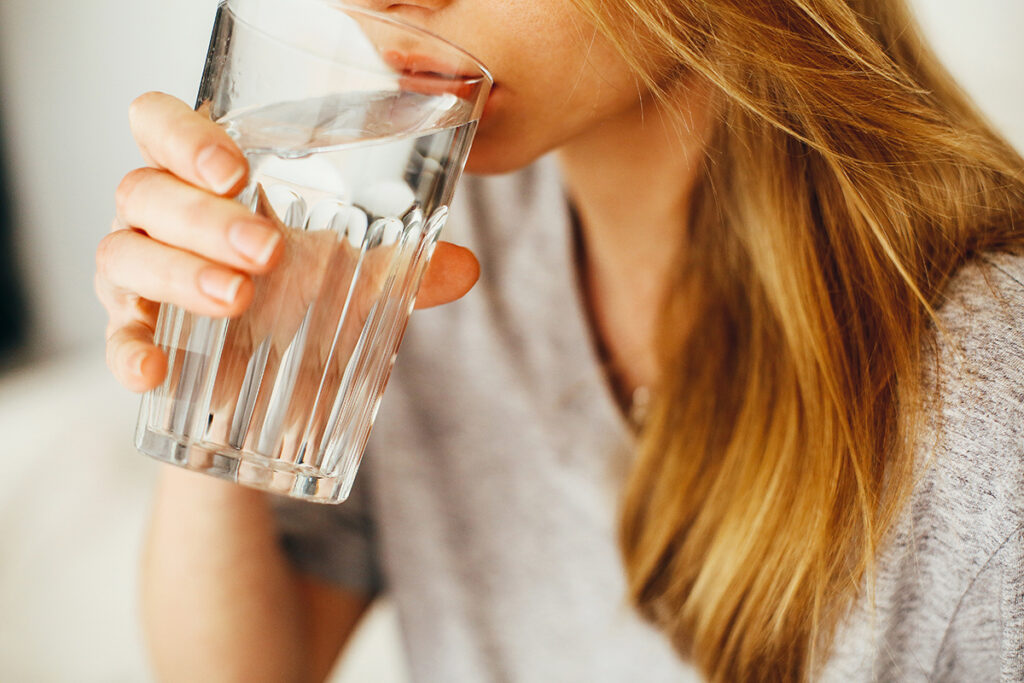By Angela Dirnbeck PT, DPT
Clinic Manager—Chesterfield, MO
As the temperature outside increases, an important thing not to neglect in these hot and humid months is our water consumption and staying adequately hydrated. We need to be certain to drink enough water and fluids to counter the complications that heat can induce our bodies, especially when doing physical activity or exercise.
The National Academies of Sciences, Engineering, and Medicine recommendation for adequate hydration in a moderate climate is drinking 2.7 L – 3.7 L of fluids per day. Fluid intake varies among age, gender, weight, activity level, and climate. However, ensuring that you are getting enough water and the right fluids will largely influence your hydration status. Most of us are familiar with the 8 x 8 rule, which reminds us to drink 8 ounces of water 8 x per day. This is equivalent of about 1.89 L. For some people this may be enough to maintain proper hydration, but depending on activity level and climate/ temperature changes, water consumption maybe needs to increase as much as 5- 10 L daily.
Here are some important tips to keep in mind if you plan to exercise, especially outdoors in warmer months.
• Drink 14-22 ounces of fluid 2-3 hours before exercise.
• Approximately 30 minutes before exercise, drink just 5 -10 ounces of water,
• Try to not over drink plain water if you are exercising vigorously and add electrolytes.
Electrolytes are minerals in the body such as calcium, potassium, magnesium, that have an electrical charge. During exercise or activities that induce excessive perspiration, such as gardening or yard work, the body will lose approximately 1.5 g salt for every kg sweat. A drink with electrolytes, such as a sports drink or coconut water, is important to ensure proper rehydration because we need to restore these electrical charges to enable the water absorption in the digestive tract.
Dehydration may occur from excessive water and electrolyte loss during exercise or prolonged activity in a warm climate, especially a hot and humid environment. Severe dehydration may even lead to heat cramps, heat illness, or even heat stroke because the body’s ability to cool itself is impaired. Humidity is another important consideration for maintaining hydration levels. The relative humidity is a percentage of the total amount of moisture the air contains. The higher the relative humidity means the greater the air is at its moisture carrying capacity. It is always important to consider relative humidity when choosing to exercise outdoors because evaporation of sweat diminishes, which may in return increase sweat production.
Other factors to consider that may negatively affect hydration are:
• Drinking too much caffeine, alcohol, or soft drinks. Try replacing with less caffeinated drinks or fruit infused water.
• If you take prescription medications or diuretics, talk to your doctor first about a safe amount of fluid intake for your specific condition and activity level.
• Eating a high protein diet may accelerate dehydration because of the increasing demand to filter the metabolic products in the kidneys, which is accelerated with protein breakdown
• Not getting enough potassium in your diet may negatively affect exercise performance and may present as muscle weakness, fatigue, or even muscle cramps. Some potassium-rich foods to include in your diet are bananas, oranges, cantaloupe and apricots, and can help combat dehydration.
• Eating more fresh fruit and vegetables can also help combat dehydration or restoring depleted levels. This is because they have high water content, and contain fiber and natural sugars, great summer options include watermelon and strawberries.
• If you exercise outdoors, consider waking up early to exercise, or plan a heavy outdoor activity for an earlier time in the day when the temperature is cooler and safer to be outdoors for a longer duration. Remember, to drink plenty of water and fluids before going to bed so you are well hydrated in the AM.

